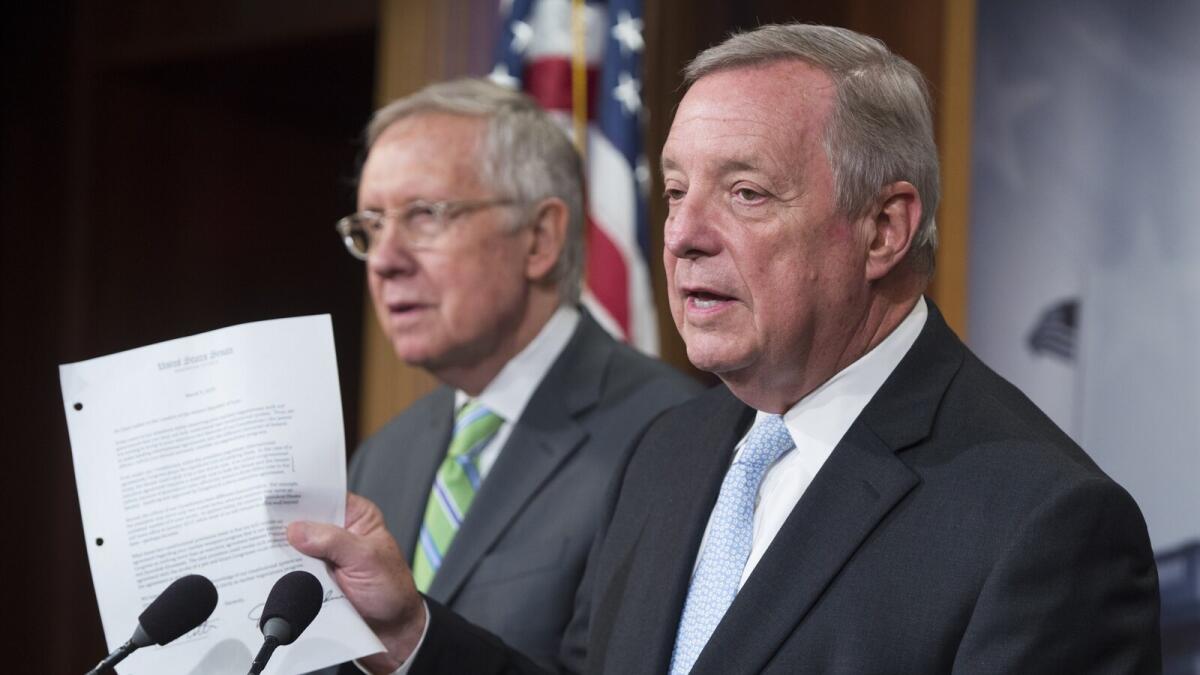US Senator Dick Durbin, Democrat of Illinois and Senate Democratic Whip, holds up a letter that was sent from Senate Republicans to the leaders of Iran, as he speaks alongside Senate Democratic Leader Harry Reid (L).
Washington - Senate Republicans insisted the fight was not over, however.
Published: Sat 12 Sep 2015, 7:05 PM
US President Barack Obama achieved perhaps the greatest foreign policy victory of his six years in office on Thursday, when a Republican-backed effort to kill the Iran nuclear agreement was narrowly blocked in the US Senate, clearing the way for the deal's implementation.
Forty Democrats and two independents voted to block a resolution disapproving of the pact in the 100-member chamber, one more than the minimum needed to keep it from advancing.
"This vote is a victory for diplomacy, for American national security, and for the safety and security of the world," Obama said in a statement after a vote he termed "an historic step forward".
Senate Republicans insisted the fight was not over, however.
The Senate's Republican majority leader, Mitch McConnell, immediately took steps to clear the way for the chamber to consider the matter again, hoping some Democrats would vote differently next time.
"We'll revisit the issue next week and see if maybe any folks want to change their minds," he said in a speech angrily denouncing the vote.
Under a law Obama signed in May, Congress has a 60-day period ending on September 17 to pass a resolution disapproving of the international agreement.
If such a resolution were to pass, and survive Obama's promised veto, it would bar the president from waiving many US sanctions on Tehran, a key component of the nuclear deal.
But there was no sign any votes would change, and Senate Democratic leader Harry Reid bluntly responded, "This matter is over with." Reid urged McConnell to move on to other legislation, including bills providing long-term highway and transportation funding and urgent legislation to fund the government in the fiscal year beginning October 1 and avoid a government shutdown.
"This is a situation where he's (McConnell) lost the vote and it's a situation where he is just not in touch with reality as it exists," Reid said.
The defeat came despite an intense $40 million lobbying campaign against the agreement, largely by hardline pro-Israel groups.
Although the nuclear deal was reached after two years of negotiations with Iran by the United States, Britain, France, Germany, Russia and China, the government of radical Israeli leader Benjamin Netanyahu vociferously opposed the agreement. Netanyahu said the deal demanded too little from Iran in exchange for sanctions relief and would strengthen a country he sees as a threat to Israel's existence.
Hours after the senate vote, Israeli ambassador Ron Dermer, who had lobbied dozens of lawmakers, said the deal "makes America and Israel much, much less safe".
Speaking at a Jewish New Year reception in Washington, he said Israel and its US ally would deepen security cooperation in the years ahead despite their differences over Iran diplomacy. But he insisted Israel also had "the power and the will to defend ourselves, a will that no deal and no force on Earth will ever break".
Republican in the House of Representatives meanwhile pushed ahead with legislation critical of the nuclear accord. They raised the possibility of filing suit against Obama over the Iran deal or attaching Iran-related legislation to a bill funding the government.
"This is a bad deal with decades-long consequences for the security of the American people and our allies. And we'll use every tool at our disposal to stop, slow, and delay this agreement from being fully implemented," House Speaker John Boehner told a news conference.
Republicans are already using the Iran deal in campaigning against Democrats in the 2016 election. On Wednesday, Republican presidential candidates Donald Trump and Ted Cruz were among the headliners at a raucous anti-deal rally on the lawn of the US Capitol. - Reuters












